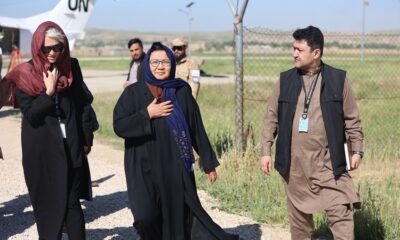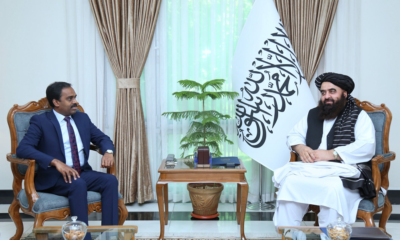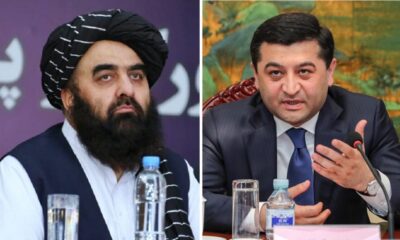World
Japan’s Prime Minister Kishida to resign, paving way for new leader
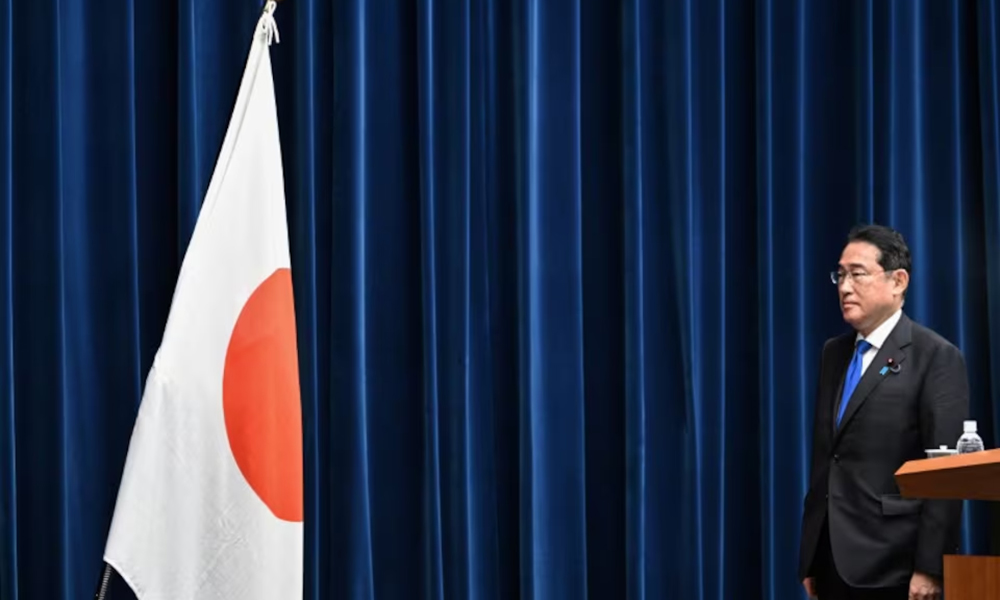
Japan’s Prime Minister Fumio Kishida said on Wednesday he would step down next month, succumbing to public disaffection over political scandals and rising living costs that marred his three-year term, and setting off a scramble to replace him.
“Politics cannot function without public trust,” he told a press conference to reveal his decision not to seek re-election as the leader of the ruling Liberal Democratic Party (LDP).
“I made this heavy decision thinking of the public, with the strong will to push political reform forward.”
The LDP will hold a contest in September to replace him as president of the party, and, by extension, as prime minister.
Kishida’s ratings dipped after he took office in 2021 following revelations about the LDP’s ties to the controversial Unification Church.
His popularity took another hit when a slush fund of unrecorded political donations made at LDP fundraising events came to light.
He also faced public discontent as wages failed to keep pace with rising living costs as Japan finally shook off years of deflationary pressure.
“An LDP incumbent prime minister cannot run in the presidential race unless he’s assured of a victory,” said Koichi Nakano, a professor of political science at Sophia University.
“It’s like the grand champion yokozunas of sumo. You don’t just win, but you need to win with grace.”
His successor as LDP leader will face the task of restoring the public’s confidence in the party and tackle the rising cost of living, escalating geopolitical tensions with China, and the potential return of Donald Trump as U.S. president next year.
U.S. President Joe Biden called Kishida’s tenure “nothing short of historic” and praised his new national security strategy, support for Ukraine, and steps to usher in a new era of U.S.-South Korea-Japan cooperation.
“Prime Minister Kishida’s courageous leadership will be remembered on both sides of the Pacific for decades to come, and I will always be grateful to call him my friend,” Biden said in a statement.
U.S. State Department spokesperson Vedant Patel told a regular briefing he had no doubt that whoever took over from Kishida “we will continue to deepen our alliance and partnership with Japan.”
Through his stint as Japan’s eighth-longest serving post-war leader, Kishida broke from previous economic policy by eschewing corporate profit-driven trickledown economics to set his sights on boosting household income, including wage hikes and promoting share ownership.
He led Japan out of the COVID-19 pandemic with massive stimulus spending and also appointed academic Kazuo Ueda as head of the Bank of Japan to guide the country out of his predecessor’s radical monetary stimulus.
In July, the BOJ unexpectedly raised interest rates as inflation took hold, contributing to stock market instability and sending the yen sharply higher.
Kishida’s departure could mean tighter fiscal and monetary conditions, depending on the candidate, said Shoki Omori, chief Japan desk strategist at Mizuho Securities in Tokyo.
“In short, risk-assets, particularly equities, will likely be hit the most,” he said.
Kishida’s premiership was also marked by a changing security environment that spurred Japan to revisit its traditionally pacifist policy.
He unveiled Japan’s biggest military buildup since World War Two with a commitment to double defence spending aimed at deterring neighbouring China from pursuing its territorial ambitions in East Asia through military force.
At Washington’s prodding, Kishida also mended Japan’s strained ties with South Korea, enabling the two and their mutual ally, the United States, to pursue deeper security co-operation against the threat from North Korea’s missile and nuclear weapons programs.
“Personally, I wish he continued a little bit more as prime minister,” said Naoya Okamoto, a 22-year-old office worker in Tokyo, the capital.
“Maybe he was stressed (with the low ratings), and with all the circumstances around him, I guess he has no choice but to step down.”
Former defence minister Shigeru Ishiba has already thrown his hat in the ring as a prospective replacement for Kishida, saying he would like to “fulfil his duty” if he gained enough support, public broadcaster NHK said.
Other names floated as potential contenders include Foreign Minister Yoko Kamikawa, Digital Minister Taro Kono, and former Environment Minister Shinjiro Koizumi.
Experts say the LDP will have to pick a fresh face that breaks from the scandals if it is to survive a general election due by the third quarter of 2025.
“If the LDP picks its next leader in a way that disregards public criticism against political funding scandals, the party could suffer a crushing defeat,” said political analyst Atsuo Ito.
“The party must choose someone young who has no ties with the present administration and thus can present a new LDP.” – Reuters
World
Trump and Zelenskiy meet one-on-one in Vatican basilica to seek Ukraine peace
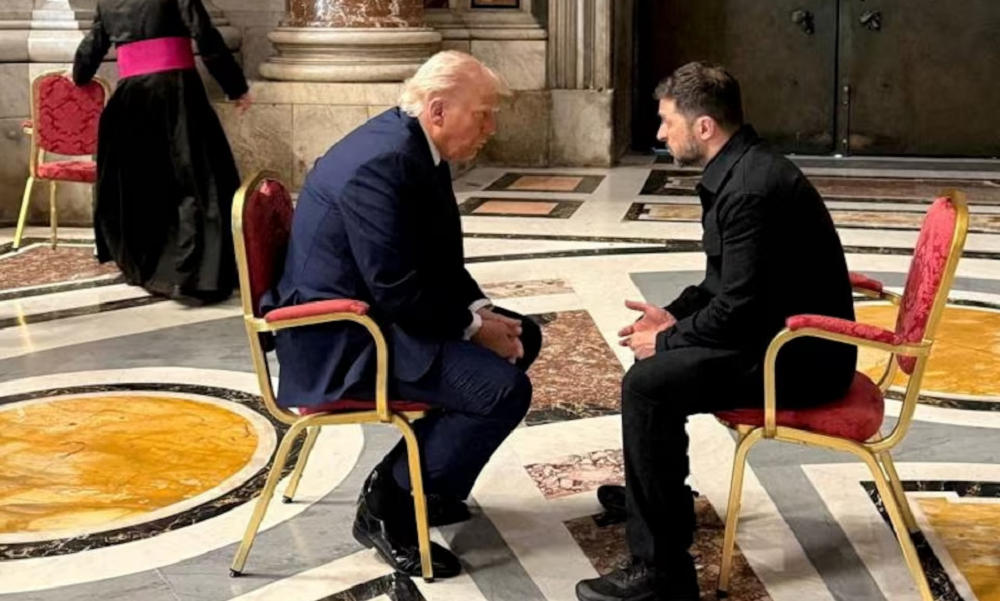
U.S. President Donald Trump and Ukrainian leader Volodymyr Zelenskiy, in Rome for the funeral of Pope Francis, met one-on-one in a marble-lined Vatican basilica on Saturday to try to revive faltering efforts to end Russia’s war with Ukraine.
Zelenskiy said the meeting could prove historic if it delivers the kind of peace he is hoping for, and a White House spokesman called it “very productive”.
The two leaders, leaning in close to each other with no aides around them while seated in St Peter’s Basilica, spoke for about 15 minutes, according to Zelenskiy’s office, which also released photographs of the meeting.
The meeting at the Vatican, their first since an angry encounter in the Oval Office in Washington in February, comes at a critical time in negotiations aimed at bringing an end to fighting between Ukraine and Russia.
In a post on social media platform Telegram, Zelenskiy wrote: “Good meeting. One-on-one, we managed to discuss a lot. We hope for a result from all the things that were spoken about.”
He said those topics included: “The protection of the lives of our people. A complete and unconditional ceasefire. A reliable and lasting peace that will prevent a recurrence of war.”
Zelenskiy added: “It was a very symbolic meeting that has the potential to become historic if we achieve joint results. Thank you, President Donald Trump!”
Steven Cheung, White House communications director, said the two leaders had met privately and had “a very productive discussion. More details about the meeting will follow”.
In one photograph released by Zelenskiy’s office, the Ukrainian and U.S. leaders sat opposite each other in a hall of the basilica, around two feet apart, and were leaning in towards each other in conversation. No aides could be seen in the image.
In a second photograph, from the same location, Zelenskiy, Trump, British Prime Minister Keir Starmer and French President Emmanuel Macron were shown standing in a tight huddle. Macron had his hand on Zelenskiy’s shoulder.
After Trump and Zelenskiy met in the basilica, the two men joined other world leaders outside in Saint Peter’s Square at the funeral service for Pope Francis, who made the pursuit of peace, including in Ukraine, a motif of his papacy.
Italian Cardinal Giovanni Battista Re, who gave the sermon at the funeral service, recalled how Pope Francis did not stop raising his voice to call for negotiations to end conflicts.
“War always leaves the world worse than it was before: it is always a painful and tragic defeat for everyone,” the cardinal said.
A Zelenskiy spokesman had earlier said aides to the two leaders were working on arrangements for a follow-up meeting in Rome later on Saturday. The spokesman subsequently said, after Trump’s aircraft took off from Rome, that the second meeting did not happen, citing the presidents’ tight schedules.
Trump, who has been pressing both sides to agree a ceasefire, said on Friday that there had been productive talks between his envoy and the Russian leadership in Moscow, and called for a high-level meeting between Kyiv and Moscow to close a deal.
Trump had previously warned his administration would walk away from its efforts to achieve a peace if the two sides do not agree a deal soon.
(Reuters)
World
Senior Russian military officer killed in car explosion near Moscow
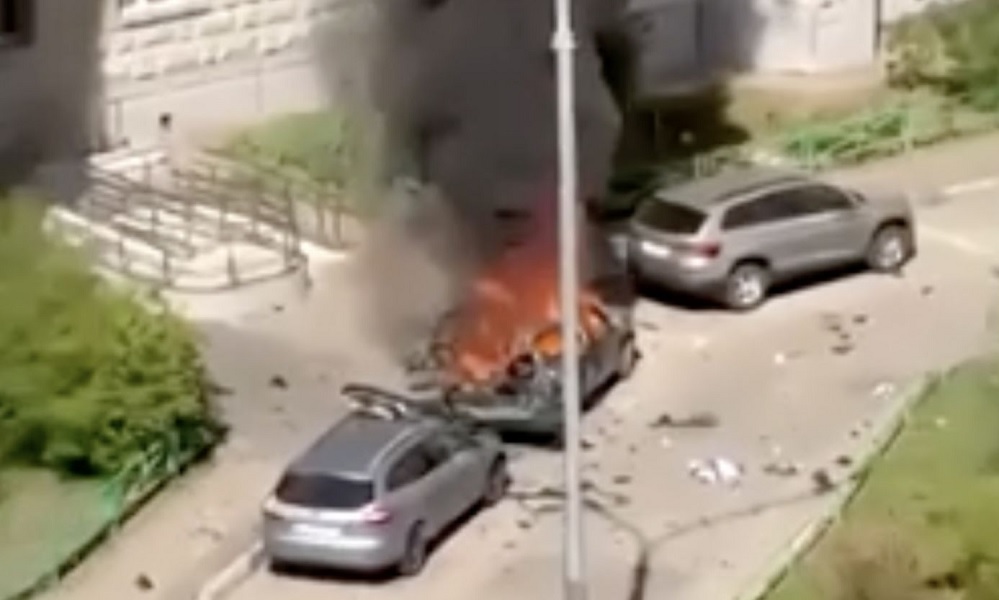
A senior Russian military officer was killed when a car exploded on Friday in the town of Balashikha just east of Moscow, Russia’s Investigative Committee said.
It named the officer as Yaroslav Moskalik, deputy head of the Main Operations Directorate of the General Staff of the Russian Armed Forces, and said it had opened a criminal case into the incident, Reuters reported.
“According to available data, the explosion occurred as a result of the detonation of a homemade explosive device filled with destructive elements,” the Investigative Committee said in a statement.
The statement did not say who might be behind the incident. Several high-ranking Russian military figures have been assassinated since the start of the war in Ukraine in operations blamed by Moscow on Kyiv.
Russian media outlet Baza, which has sources in Russia’s law enforcement agencies, said a bomb in a parked car had been detonated remotely when the officer – who lived locally – walked past.
The Izvestia newspaper published video footage showing a person approaching a line of parked cars outside an apartment complex and an explosion that sent parts of a vehicle flying metres into the air.
Kommersant newspaper said a second person was also killed.
Moskalik, who held the rank of major general, had participated in several high-level Russian delegations, according to defence ministry bulletins and media reports.
He joined the Russian contingent in a meeting in October 2015 of the Normandy Format, a group made up of teams from Germany, Russia, Ukraine and France who oversaw the Minsk agreements designed to end the war between Ukraine and Russian-backed separatist forces that broke out in 2014.
Moskalik represented the army’s General Staff at the negotiations alongside Foreign Minister Sergei Lavrov and Kremlin aide Yuri Ushakov, according to the Kremlin website.
Russia’s RBC newspaper listed Moskalik as a participant in the security subgroup in the Minsk talks.
In December, Ukraine’s SBU intelligence service used a bomb hidden in an electric scooter to kill Lieutenant General Igor Kirillov, whom Kyiv accused of being responsible for the use of chemical weapons against Ukrainian troops.
The SBU did not immediately respond to a request for comment on the reported death of Moskalik.
World
Ukraine ready to hold talks with Russia once ceasefire in place, Zelenskiy says
Zelenskiy said he would be happy to meet U.S. President Donald Trump later this week when they attend the funeral of Pope Francis along with other world leaders.
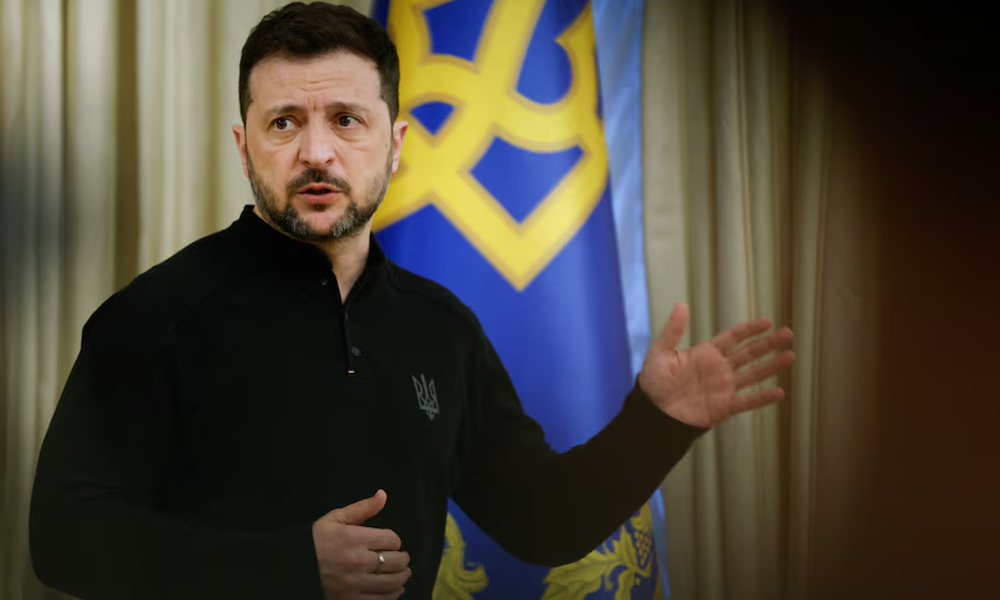
President Volodymyr Zelenskiy said on Tuesday that Ukraine would be ready to hold talks with Russia in any format once a ceasefire deal is in place and the fighting has stopped, Reuters reported.
The Ukrainian leader also told reporters at a briefing that a Ukrainian delegation meeting officials from Western countries in London on Wednesday would have a mandate to discuss a full or partial ceasefire.
“We are ready to record that after a ceasefire, we are ready to sit down in any format so that there are no dead ends,” Zelenskiy said in the presidential office in Kyiv.
“It will not be possible to agree on everything quickly,” he warned, noting numerous highly complex issues such as territory, security guarantees and Ukraine’s membership in the NATO military alliance.
He said that Ukraine would not recognise Moscow’s de jure control of the peninsula of Crimea as part of any deal as such a move would go against the Ukrainian constitution. Russia seized Crimea in 2014 and later annexed it.
Ukraine, he said, would be ready to partner with the United States to restore the work of the vast, Russian-occupied Zaporizhzhia nuclear power plant. There had been no such formal proposal from Washington about that, however, he added.
The talks in London, which are set to bring together officials from the United States, Britain, France, Germany and Ukraine, come amid a flurry of U.S.-led diplomatic efforts to find a way to end Russia’s war with Ukraine, read the report.
In an apparent change of plan, U.S. Secretary of State Marco Rubio will not be attending the talks in London, a State Department spokesperson said on Tuesday, adding that Washington’s Ukraine envoy General Keith Kellogg would attend.
Zelenskiy said he would be happy to meet U.S. President Donald Trump later this week when they attend the funeral of Pope Francis along with other world leaders.
Ukraine, Zelenskiy said, would also step up its diplomatic outreach this week and that he would meet South African President Cyril Ramaphosa, as well as the leaders of Spain, Poland and the Czech Republic.
-

 Sport4 days ago
Sport4 days agoSri Lanka A defeats Afghanistan A by 4 wickets in Abu Dhabi
-

 Business5 days ago
Business5 days agoAfghanistan’s growth prospects remain uncertain amid global uncertainty: World Bank report
-
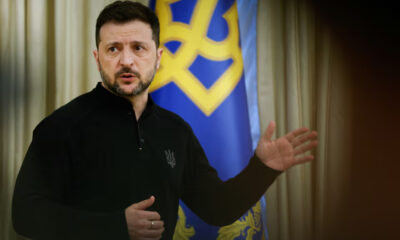
 World5 days ago
World5 days agoUkraine ready to hold talks with Russia once ceasefire in place, Zelenskiy says
-

 Latest News4 days ago
Latest News4 days agoAWCC activates new site in Nangarhar’s Kuz Kunar district
-

 Latest News4 days ago
Latest News4 days agoTarig Ali Bakheet and Japan’s Deputy Foreign Minister discuss Afghanistan’s situation
-

 Climate Change5 days ago
Climate Change5 days agoPowerful earthquake of 6.2 magnitude shakes Istanbul
-

 Business4 days ago
Business4 days agoPakistan’s deputy PM discusses Trans-Afghan Railway Line project with Uzbek FM
-

 Latest News4 days ago
Latest News4 days agoSpecial meeting will be held to launch Afghanistan–Russia joint commission, says Kabulov


